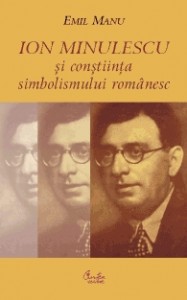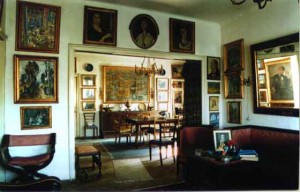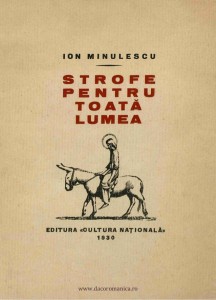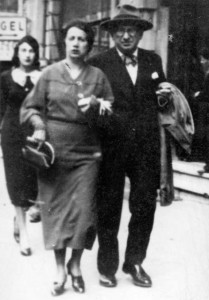Poetry in translation (CCCXXII): Ion MINULESCU (1881– 1944), (ROMANIA) – “Rugă pentru Duminica Floriilor”, “Palm Sunday Prayer”
Ion MINULESCU
(1881– 1944)
Palm Sunday Prayer
Release me, oh, good Father, of what I swore to be…
Forgive my errant pathways: accept them as they are:
A hymn of early prayers, before Thy Holy See,
To add a limpid raindrop
On Thy eternal breeze…
Release me, oh, good Father, of trying to endure
The granite cut with ease,
The bronze made of manure…
A glittering pearl necklace, made of sunflower seeds,
A double-winged Pegasus out of a humble bee …
Forgive me, though, dear Father, of this – mine foolish jest,
To have imagined Thee –
As I thought might be best…
But the World was too pallid, than I thought it might be.
My Lord, sprinkle my eyebrows, with drops of holly sea.
Chastise my sinful body,
Behold my tongue of python,
Remove the foolish demon, that pronounced the unheard.
Do give zest to my body, depicted in Your icon…
To forget I was ever beholden by Thy word!
Rendered in English from the original Romanian verse: by Constantin ROMAN, London
© 2015 Copyright Constantin ROMAN, London
* * * * * * *
Ion MINULESCU (1881– 1944)
Rugă pentru Duminica Floriilor
Dezleagă-mă, Părinte, de ce-am jurat să fiu
Şi iartă-mă că-n viaţă n-am fost decât ce sunt –
Un cântec prea devreme, sau poate prea târziu,
Un ropot scurt de ploaie
Şi-un mic vârtej de vânt…
Dezleagă-mă de vină de-a fi-ncercat să fac
Granit din caramidă
Şi bronz din băligar,
Colan de pietre scumpe din sâmburi de dovleac
Şi-un Pegas cu-aripi duble din clasicul măgar…
Şi iartă-ma că-n viaţă n-am fost decât aşa
Cum te-am văzut pe tine –
C-aşa credeam că-i bine!…
Dar azi, când văd ca-i altfel de cum am vrut să fie,
Stropeşte-mi ochii, Doamne, cu stropi de apă vie,
Retează-mi mâna dreaptă
Şi pune-mi strajă gurii,
Alungă-mi nebunia din scoarţele Scripturii
Şi-apoi desprinde-mi chipul de pe icoana Ta
Şi fă să uit c-odată am fost şi eu ca Tine!…
* * * * * * *
SHORT BIO:Ion Minulescu (6 January 1881 – 11 April 1944) was an avant-garde poet, novelist, short story writer, journalist, literary critic, and playwright. Often publishing his works under pseudonyms, he journeyed to Paris, where he was influenced by the growing Symbolist movement and Parisian Bohemian life. A herald of Romania’s own Symbolist movement, he had a major influence on local modernist literature, and was among the first local poets to use free verse.Between 1900 and 1904, Minulescu studied Law at the University of Paris, during which period he was an avid reader of Romantic and Symbolist literature of Gérard de Nerval, Arthur Rimbaud, Charles Baudelaire, Aloysius Bertrand, Jehan Rictus, Emil Verhaeren, Tristan Corbière, Jules Laforgue, Maurice Maeterlinck, and the Comte de Lautréamont. He also became close to Romanian artists present in Paris — Gheorghe Petraşcu, Jean Alexandru Steriadi, Cecilia Cuţescu-Storck, and Camil Ressu, as well as to the actors Maria Ventura and Tony Bulandra. Among the defining moments of his life in Paris was his meeting to the poet Jean Moréas, who apparently urged him to write his poetry in French. On his return to Romania he began cultivating relations with the local art dealer Krikor Zambaccian and the painter Nicolae Dărăscu. Minulescu and Anghel became close friends, and together translated pieces by various French Symbolists such as Albert Samain, Charles Guérin, and Henri de Régnier: these were later compiled in a single volume, in 1935. Earlier on, in 1928, Ion Minulescu was awarded the National Poetry Prize. He died from a heart attack during World War II, as Bucharest was the object of a large-scale Allied bombing. He was buried at the Bellu cemetery.






No Comments so far ↓
Like gas stations in rural Texas after 10 pm, comments are closed.